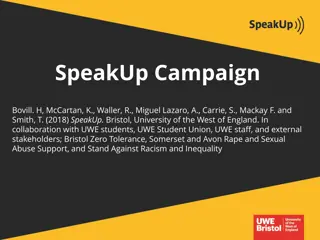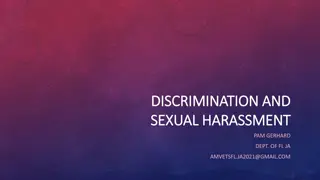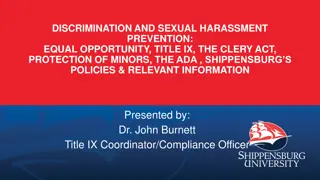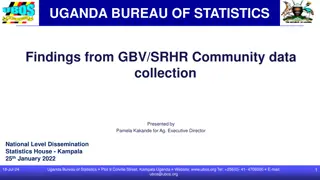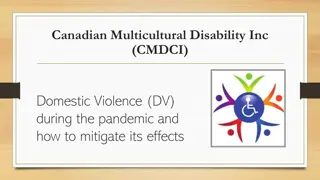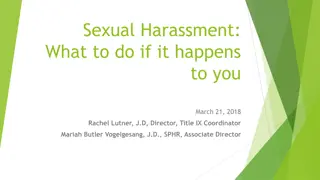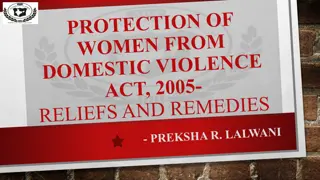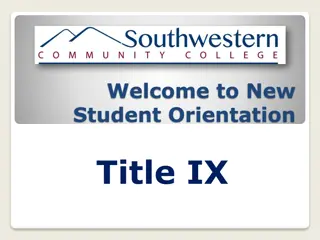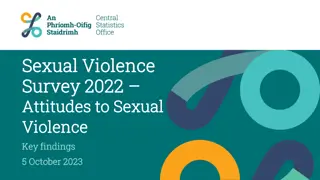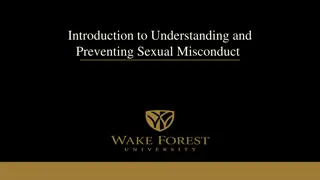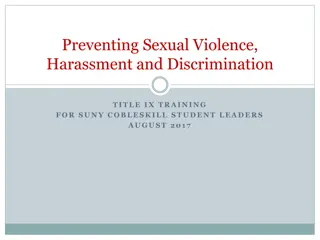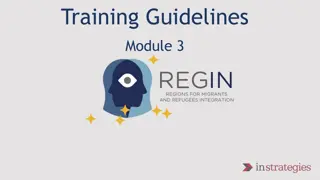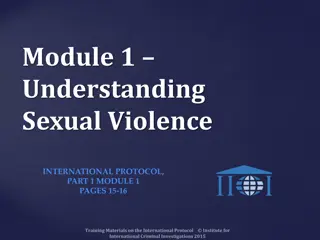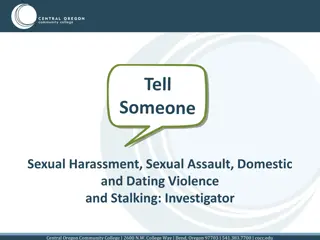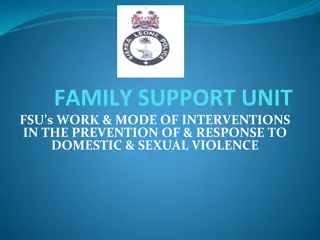Understanding Title IX: Addressing Sexual Discrimination and Violence on College Campuses
Title IX is a federal law prohibiting sex discrimination in educational institutions, aiming to provide equitable treatment for all students. This law addresses sexual discrimination, violence, and harassment on college campuses, emphasizing the importance of prevention, reporting, and support for victims. It outlines investigation principles, statistics on sexual assault, and the obligation of colleges to address these issues effectively. Everyone is encouraged to be vigilant and report any suspicious activities to uphold Title IX responsibilities.
Download Presentation

Please find below an Image/Link to download the presentation.
The content on the website is provided AS IS for your information and personal use only. It may not be sold, licensed, or shared on other websites without obtaining consent from the author. Download presentation by click this link. If you encounter any issues during the download, it is possible that the publisher has removed the file from their server.
E N D
Presentation Transcript
Emmanuel College Title IX Training Mandrake T. Miller Vice President for Student Life Title IX Coordinator
What is Title IX? No person in the United States shall, on the basis of sex, be excluded from participation in, be denied the benefits of, or be subjected to discrimination under any education program or activity receiving Federal financial assistance. Title IX of the Education Amendments of 1972 Implementing Regulations at: 20 U.S.C. 1681 & 34 C.F.R. Part 106 2
Title IX Principles: Investigation= Thorough Reliable Impartial Process= Prompt Effective Equitable Remedy effects upon reporting party & community END Prevent recurrence Remedies= Discrimination 3
Sexual Discrimination, violence, and harassment on Campuses Federal law that prohibits sex discrimination in educational institutions Title IX (1972) Requires colleges and universities in the United States to disclose information regarding crime on and around campus The Jeanne Clery Act (1998) VAWA (2013) - Violence Against Women Act The Violence Against Women Act is aimed at improving how colleges address sexual violence; imposes obligations to revise policies and practices SaVE Act (2014) - Campus Sexual Violence Elimination Act Part of the VAWA amendments, made changes to the Jeanne Clery Act; requires colleges to report additional sexually violent crimes 4
Relevant Statistics 20% of college women and 6% of college men will be victims of attempted or actual sexual assault 13% of college women report being stalked each year 4 in 10 violent crimes against college students are committed while one or both parties are using drugs or alcohol In 8 out of 10 cases of rape, the victim knows the perpetrator More than 90% of sexual assault victims on college campuses do not report the assault National Sexual Violence Resource Center https://www.nsvrc.org/statistics
SEE SOMETHING SAY SOMETHING!!! TITLE IX IS EVERYONE S RESPONSIBILITY 6
Sexual Harassment/ Misconduct Prohibits sex discrimination, including sexual harassment and sexual violence Under Title IX, schools are legally required to respond and remedy hostile educational environments and failure to do so is a violation that means a school could risk losing its federal funding. Our policy applies to the entire campus community, including you as an employee. We need to change our language from Title IX to Sexual Misconduct Title IX is not a verb, it s a law. 8
Sexual Harassment/Misconduct SEXUAL EXPLOITATION: Sexual exploitation occurs when a student or staff takes non-consensual or abusive sexual advantage of another for his/her own advantage or benefit, or to benefit or advantage anyone other than the one being exploited, and that behavior does not otherwise constitute one of other sexual misconduct offenses. Examples of sexual exploitation include, but are not limited to: Invasion of sexual privacy; Prostituting another student; Non-consensual video or audio-taping of sexual activity; Going beyond the boundaries of consent (such as letting your friends hide in the closet to watch you having consensual sex); (staff and students) Any act that is sexual in nature when such an act is likely to threaten any party s health and/or safety without his/her knowing and valid consent. This includes, but is not limited to, any act that may reasonably be expected to transmit HIV or other sexually transmitted diseases and is performed when either party has failed to divulge his/her infection with such a disease; 9
Sexual Harassment/Misconduct Exposing one s genitals in non-consensual circumstances; Inducing another to expose their genitals; Sexually-based stalking and/or bullying may also be forms of sexual exploitation. Engaging in voyeurism; Sexual assault Dating/Domestic Violence Sexual Harassment Non-consensual sexual contact Stalking Retaliation 10
Reporting and responding parties Reporting Party An individual who brings forth a report of a violation against whom a possible violation occurred. Responding Party An individual accused of a violation 11
Retaliation Any adverse action taken against an individual for: Alleging harassment or discrimination, Supporting a reporting party, or Assisting in providing information relevant to a claim of harassment or discrimination (e.g., serving as a witness) Retaliation is a serious violation of College policy and will be addressed under the College s grievance and/or employment policies. Emmanuel College will take all appropriate actions to protect individuals who fear that they may be subjected to retaliation. 12
Consent Consent is knowing, voluntary and clear permission by word or action, to engage in mutually agreed upon sexual activity. Consent can be withdrawn at any time during a sexual activity by expressed word or action. Consent to some activity cannot be presumed consent to other activity. 13
IMPORTANCE OF REPORTING 14
Reporting Reporting Obligations: When in doubt, report. Don t wait. The College is considered to be on notice the second that a responsible employee has been made aware of alleged sexual misconduct. (The date and time that a staff person was made aware of the incident) As a responsible employee you are required to report incidents/allegations of sexual misconduct. Confidential Resources: Chris Maxwell, Mandy Moore, and School licensed counselor. Be upfront with your students about your reporting obligations. 15
Reporting continued Responsible Employees All college employees are responsible employees, unless their positive explicitly grants them confidentiality rights. Reports must be brought to the Title IX Coordinator/VP of Student Life Managers or supervisors who receive reports are required to notify the Title IX Coordinator when a report is received.
Reporting continued When sexual misconduct or gender discrimination is reported to you: Report ASAP. Email your Title IX Coordinator (Mandrake Miller) mandrake.miller@ec.edu If a student asks you to serve as their advisor (support person) during an ongoing investigation, you can, as long as there is no conflict of interest. We do our best to put the reporting individual in the driver s seat and do our best to honor their wishes. They have options. 17
Reporting continued When sexual misconduct or gender discrimination is reported to you: Support the reporting individual. Validate the reporting individual s feelings. But remember, your job is not to be an investigator. Respect the privacy of the reporting individual. Do not discuss the information shared with you to anyone outside of the Title IX Coordinator. (FERPA issue as well). AVOID: Notifying the respondent of the complaint; Attempting to mediate the issue; Discouraging the complainant to file a report; and Asking bias or weighted questions that could be viewed as blaming. 18
Reporting continued Helpful Reminders and things to be aware of: Office hours and self-protection Counselor/Clergy status outside of EC (understanding the role you are operating in) Documentation: Report ASAP, don t wait-you put yourself and the College at liability. Warning Signs Emails from myself regarding accommodations. Boundaries, don t get over-involved. How you approach or speak about issues in your classroom related to sexual misconduct (drugs, alcohol, dress, sex, programmatic initiatives). Group texts/Team Chats Dating/Romantic Relationships Social Media Boundaries Know who your minor students are Traveling and sexual misconduct 19
Reporting continued If you are experiencing sexual harassment/misconduct in the workplace, please do not hesitate to reach out. You have options. We do not want our employees subjected to a hostile work environment. We can t address what we don t know. Please reach out. Harassment/Misconduct can occur male/male, female/female, female/male, male/female, student/student, employee/employee, student/employee, employee/student 20
How to be PROACTIVE Encourage Students to: Be informed about Title IX Be an active bystander determine to look out for each other (See something say something, step in or stop and call). If going to parties, consider: Abstaining from Alcohol Going and returning in groups of 2-3 Never leave drinks alone or accept a drink handed to them from someone Engage in pre-party discussions with friends who agree to watch out for them Trust your instincts Know the definition of Consent and how to ask for it and to give it. Take Action About a Violation In Seeking Help Help students to be informed and to look out for themselves and each other in the decisions they make.
How to be Supportive Students that come to you to report harassment or an assault will likely be in distress. Your response matters! What to do: Be informed about Title IX Make sure the individual is safe and determine whether they are in need of medical attention Use active listening skills Be patient Listen without judgement (never blaming) Display empathy and compassion Let the individual lead the conversation
How to be supportive contd. Students that come to you to report harassment or an assault will likely be in distress. Your response matters! What to do: Honor his/her boundaries (everyone reacts differently to situations) Remain calm and do not act as an investigator Connect them to campus and community resources Encourage reporting to Title IX Coordinator but you must also report Encourage accessing Campus Counselors/Campus Ministry/Other Resources
Title IX Coordinator Responsibilities Creation, implementation, and enforcement of institutional policy Assurance of compliance with stop, prevent, remedy Oversight and coordination of prompt and equitable grievance procedures Point-person for complaints and meeting with reporting and responding parties Assurance with compliance with final sanctions Compliance oversight Training oversight Athletics gender equity oversight Contact for government inquiries and Title IX inquiries
NO MATTER WHAT NO MATTER WHAT YOU MUST REPORT YOU MUST REPORT
See Something..Say Something Step Up! Step In! Stop & Report
Thank YOU. Go LIONS! 27





